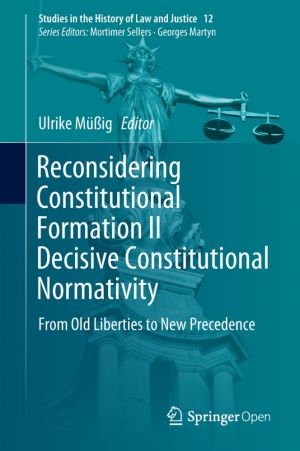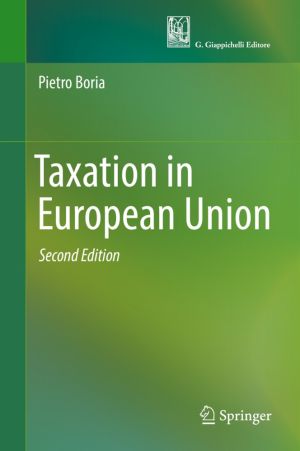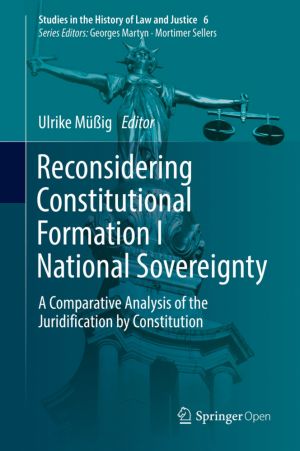Reconsidering Constitutional Formation I National Sovereignty
A Comparative Analysis of the Juridification by Constitution
by Ulrike Müßig
DescriptionDetailsHashtagsReport an issue 






Book Description
Legal studies and consequently legal history focus on constitutional documents, believing in a nominalist autonomy of constitutional semantics.Reconsidering Constitutional Formation in the late 18th and 19th century, kept historic constitutions from being simply log-books for political experts through a functional approach to the interdependencies between constitution and public discourse. Sovereignty had to be 'believed' by the subjects and the political élites. Such a communicative orientation of constitutional processesbecame palpable in the 'religious' affinities of the constitutional preambles. They were held as 'creeds' of a new order, not only due to their occasional recourse to divine authority, but rather due to the claim for eternal validity contexts of constitutional guarantees. The communication dependency of constitutions was of less concern in terms of the preamble than the constituents' big worries about government organisation. Their indecisiveness between monarchical and popular sovereignty was established through the discrediting of the Republic in the Jacobean reign of terror and the 'renaissance' of the monarchy in the military resistance against the French revolutionary and later Napoleonic campaigns. The constitutional formation as a legal act of constituting could therefore defend the monarchy from the threat of the people (Albertine Statute 1848), could be a legal decision of a national constituent assembly (Belgian Constitution 1831), could borrow from the old liberties (Polish May Constitution 1791) or try to remain in between by referring to the Nation as sovereign (French September Constitution 1791, Cádiz Constitution 1812). Common to all contexts is the use of national sovereignty as a legal starting point. The consequent differentiation between constituent and constituted power manages to justify the self-commitment of political power in legal terms. National sovereignty is the synonym for the juridification of sovereignty by means of the constitution. The novelty of the constitutions of the late 18th and 19th century is the normativity, the positivity of the constitutional law as one unified law, to be the measure for the legality of all other law. Therefore ReConFort will continue with the precedence of constitution. (www.reconfort.eu)This open book is licensed under a Creative Commons License (CC BY). You can download Reconsidering Constitutional Formation I National Sovereignty ebook for free in PDF format (3.9 MB).
Book Details
Title
Reconsidering Constitutional Formation I National Sovereignty
Subject
Education and Teaching
Publisher
Springer
Published
2016
Pages
296
Edition
1
Language
English
ISBN13
9783319424040
ISBN10
3319424041
ISBN13 Digital
9783319424057
ISBN10 Digital
331942405X
PDF Size
3.9 MB
License

Related Books

This second volume of ReConFort, published open access, addresses the decisive role of constitutional normativity, and focuses on discourses concerning the legal role of constitutional norms. Taken together with ReConFort I (National Sovereignty), it calls for an innovative reassessment of constitutional history drawing on key categories to convey ...

This two-volume book, published open access, brings together leading scholars of constitutional law from twenty-nine European countries to revisit the role of national constitutions at a time when decision-making has increasingly shifted to the European and transnational level. It offers important insights into three areas. First, it explores how c...

This book analyzes issues in human rights law from a variety of perspectives by eminent European and Asian professors of constitutional law, international public law, and European Union law. As a result, their contributions collected here illustrate the phenomenon of cross-fertilization not only in Europe (the EU and its member states and the Counc...

This book provides a comprehensive and systematic overview of the main topics of taxation in European law. The sequence of arguments follows an institutional logic, respecting the academic tradition of tax law. It first outlines the general framework of EU institutions, with a particular focus on the set of regulations regarding taxation with refer...

Describes a new plan to improve the current election system under which every voter gains and no state loses its current Electoral College benefits, which has a chance to be introduced in the form of a constitutional amendment.
Provides explanations of why the National Popular Vote plan may violate the Equal Protection Clause from the Fourteenth A...

In 2007, 144 UN member states voted to adopt a Declaration on the Rights of Indigenous Peoples. Australia, Canada, New Zealand and the US were the only members to vote against it. Each eventually changed its position. This book explains why and examines what the Declaration could mean for sovereignty, citizenship and democracy in liberal societies ...

